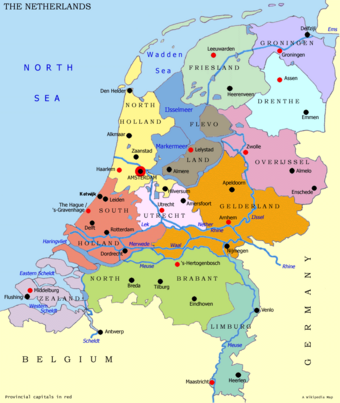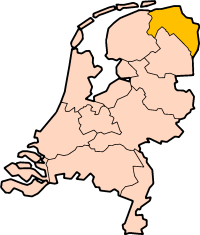Groningen (province)
| Provincie Groningen Province of Groningen |
|||||
|
|||||
| Capital | Groningen | ||||
| Queen's Commissioner | Max van den Berg | ||||
| Religion (1999) | Protestant 29% Catholic 7% |
||||
| Area • Land • Water |
2,336 km² (8th) 623 km² |
||||
| Population (2006) • Total • Density |
574,042 (9th) 246/km² (9th) |
||||
| Anthem | Grunnens Laid | ||||
| ISO | NL-GR | ||||
| Official website | www.provinciegroningen.nl | ||||
Groningen is the northeasternmost province of the Netherlands. In the east it borders the German state of Niedersachsen (districts of Leer and Emsland), in the south Drenthe, in the west Friesland and in the north the Wadden Sea. The capital of the province is the city of Groningen.
Contents |
Geography
Land use in Groningen is mainly agricultural, it has a large natural gas field near Slochteren.
History
Originally a part of Frisia, Groningen became a part of the Frankish Empire around 785. Charlemagne assigned the Christianization of this new possession to Ludger. In the 11th century, the city of Groningen was a village in Drenthe that belonged to the Bishopric of Utrecht, while most of the province was in the diocese of Münster. During the Middle Ages, central control was remote, and the city of Groningen acted as a city state, exerting a dominating influence on the surrounding Ommelanden. Around 1500, Maximilian I, Holy Roman Emperor gave Groningen and Friesland to Albert, Duke of Saxony, who could however not establish permanent control. In 1514/15 Groningen came to the Duchy of Guelders, and in 1536 to the Habsburg Netherlands. In 1594, Groningen was conquered by the United Netherlands, to which it belonged henceforth.
Political history
East Groningen was the scene of a particularly fierce class struggle in the 19th and 20th centuries. Perhaps not coincidentally, Groningen boasts the only municipality (Beerta) where the Communist Party of the Netherlands has ever had a mayor (Hanneke Jagersma).

Dialect
Groningen is home to a typical Low Saxon dialect called Gronings (Grönnegs / Grunnegs in Gronings regional language), with local nuances. Nowadays, many inhabitants of the province do not speak the dialect, especially in the city of Groningen where many outsiders have moved.
Municipalities
- Appingedam
- Bedum
- Bellingwedde
- De Marne
- Delfzijl
- Eemsmond
- Groningen
- Grootegast
- Haren
- Hoogezand-Sappemeer
- Leek
- Loppersum
- Marum
- Menterwolde
- Pekela
- Reiderland
- Scheemda
- Slochteren
- Stadskanaal
- Ten Boer
- Veendam
- Vlagtwedde
- Winschoten
- Winsum
- Zuidhorn
People from Groningen Province
- Cornelis Dopper, conductor and composer.
- Albert Eckhout, painter.
- Wiebbe Hayes, a Dutch soldier and national hero in the 1600s.
- Lenie 't Hart, animal rights activist
- Jozef Israëls, painter.
- Aletta Jacobs, first woman to study medicine in the Netherlands.
- Freek de Jonge, cabaret artist.
- Jurrie Koolhof, former football striker. Played 106 matches for PSV Eindhoven.
- Gerrit Krol, writer.
- Jan Mulder, former football player. Played for Ajax Amsterdam
External links
- Website of the Province
- Flag
- Website of the Capital City
- Alternative Website of the Capital City (Local Shops and Small Businesses)
- Map of Groningen
- Website of the University
- Website of the Polytechnic
- Map of Province
|
|||||||
|
||||||||||||||||||||



